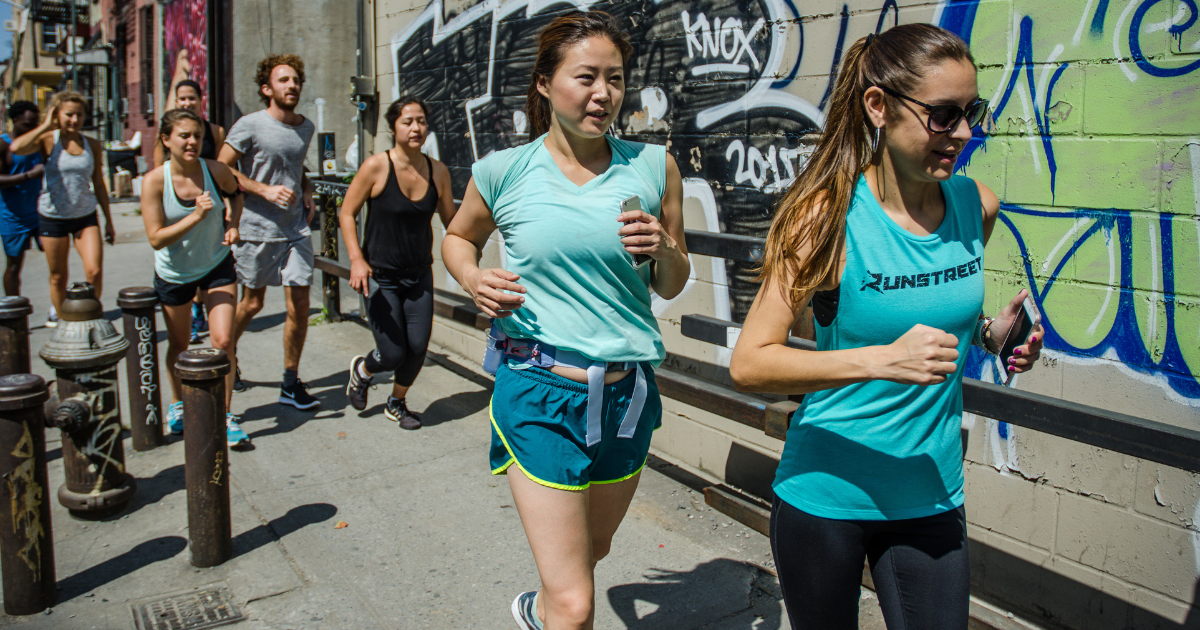Find a Running Coach with These Expert Tips
Running in Brooklyn. Photo by Marques Jackson Photography.
By Marnie Kunz, NASM-certified trainer, USATF- RRCA-certified run coach
If you’re looking for tips to find a running coach, you’ve come to the right place. As a longtime NYC running coach, I can offer guidelines on what qualifications to look for, as well as offer tips to find the best running coach for you. In addition to looking for certified coaches, it’s important to make sure your running coach has a coaching style that suits your training goals and personality. You will also want to find a coach who is available in your area or virtually, depending on your needs. Coaches can help athletes of all ages and levels make progress toward their running goals with structured run workouts.
What Is a Running Coach?
Before we look into more specifics to help you find a running coach, first let’s go over what a running coach does. A running coach helps runners develop running skills and follow a running training program that builds fitness and endurance. Depending on your running goals, a coach can help you get faster, improve your fitness level, be able to run farther, and get your fastest race times.
A running coach will offer a well-planned running program that builds you up physically and mentally to tackle your running goals. A good running coach will focus on your mental training and mental health as well as your physical health. Your coach will offer motivation, encouragement, and mental strategies to help you conquer your self-doubt and overcome challenges that arise in your training.
The coaching process usually includes an intake meeting or assessment to determine your running and fitness goals and experience. The intake is a great time to also ask your potential coach about their coaching experience and philosophy.
Running Coach Options
Consider what training format works best for you before you begin your running coach search. Running coaches can meet in person or they may coach virtually, and many offer both options. I train a limited number of people in Brooklyn, for instance, as well as offer custom training plans and virtual training for people around the world.
If you want to work with a coach locally, some coaches will run with you - some even offer race pacing services to run with you in races - and others will meet with you at a track and offer you feedback and workout guidance but will not run with you. Your coach may give you speedwork and drills when you meet.
Related Post: 10 Running Drills to Become a Better Runner
For virtual training, your coach will create a personalized running plan for you to follow to meet your goals, and they may also meet with you virtually to check in. I offer email support for all my customized running plans. I love virtual coaching and hearing about people’s progress in their running and races around the world, and I am happy to answer any questions that come up along the way.
Running Coach Credentials
As with most professions, you will want to make sure your running coach has professional credentials. Some of the biggest running coach certification organizations in the U.S. are the U.S.A. Track and Field Association (USATF) and the Road Runner’s Club of America (RRCA).
Where I live in NYC, all the running coaches I know have one of these two certifications (myself included - I have both). There are other certifying bodies I’ve found through research, including the United Endurance Sports Coaching Academy, which offers an ultra running coach certification to specialize in really long-distance training.
Specializations
Running photo by Marques Jackson Photography.
Most running coach certification programs also have advanced options or specialties so your coach may specialize in long-distance running, sprinting, or track and field events. Other complementary certifications a running coach may have include personal training certifications or nutrition coaching certifications.
I have a National Academy of Sports Medicine (NASM) personal trainer certification, for instance, which helps me to design strength training programs for runners and have a deeper understanding of anatomy and injury prevention. I often include strength training workouts in the training schedule for my athletes.
First Aid and CPR Certification
You will also want to make sure your running coach is certified in First Aid and CPR in case of emergencies. I know the RRCA and USATF require current First Aid/CPR certifications to be listed in their coaches directory.
You can find certified USATF running coaches in the USATF coaches registry. USATF also requires completing a SafeSport course and passing a background check to be listed in their directory. You can find certified RRCA coaches in the RRCA coaches directory. These directories are a good place to cross-check a running coach’s references.
To verify other fitness certifications, you can check NASM’s directory of trainers, and ACE’s directory of trainers. Any reputable running coach or trainer certification organization will have a directory that you can look up to verify the credentials of your coach.
Where to Find A Running Coach Near You
If you’re looking for a local running coach, you can check the USATF coaches registry and RRCA coaches directory for your city and state.
If you prefer to use an app, you can use the CoachUp app, which has listings for local running coaches. I am listed as a Brooklyn running coach on CoachUp, for instance. CoachUp also has reviews, so you can see your coach’s ratings on the app. The app also has an option for coaches to complete a background check, so you can see if your coach is verified by the CoachUp background check.
You can also Google your city name and running coach and check out the options. Some running coaches have websites where you can see their rates and reviews or testimonials.
How to Find an Online Running Coach
If you just need a training plan or if you want to check in with your coach remotely but do not need to train in person, then you can find an online running coach. Also if you do not have any running coaches in your area, an online coach is a good option.
You can use the same techniques for finding a local coach, using the coaching directories as a good starting point. Check out reviews and testimonials on your coach’s website, and you can also check out their social media to get an idea of what kind of training and style they use.
Questions to Ask Your Coach
Here are some questions to consider when you are looking for a running coach:
What do you want to accomplish from working with your running coach?
Does your coach have experience coaching people with similar goals to yours?
What style of coaching works best for you? Do you need someone to bark orders in drill sergeant style or someone who is emotionally attuned and compassionate?
What challenges do you face in your running that a coach can help you overcome?
Is your coach accredited?
Does your coach offer any discounts on training packages or deals for gear?
What do reviews and testimonials say?
Message your top potential running coach candidates to ask any questions you have.
When you contact a running coach, they should be responsive and reply within 1-2 business days. Pay attention to the coach’s tone and see if they answer your questions.
Once you sign up, many coaches will do a special intake session or an assessment, and this will help you both get to know each other better. It’s as important to be accurate and detailed in your assessment so your coach can create the best training program to suit your goals.
Assessment
When I create custom training plans for clients, I have a thorough assessment questionnaire that clients fill out, and it helps me make the best running plan to suit their needs and goals. When clients provide specific details like their fastest race times, farthest runs, or goal race times, it helps me to calculate the most detailed speed workouts and training program possible. Also, let your coach know how often you will be training regularly so they can create a plan that you will be able to stick to.
Training Goals
Whether you are training for a marathon or your first 5K race, see if your coach has coached people with similar goals to yours. I train people for the NYC Marathon every year, for instance, and I have run the NYC Marathon, so that makes me especially qualified to train someone to run the NYC Marathon.
I also have a strong track background and enjoy creating speed workouts, so I would be able to help someone who wants to run a faster mile, 5K, or half marathon race. If someone wants to learn how to incorporate strength training, speed work, or visualization into their running program, I am very experienced in these areas.
Background
Another thing to consider is your demographics and if you prefer a coach who is in your group. As a woman runner, I tend to attract more female clients and members of the LGBTQ+ community.
After growing up running competitively in track and cross country, I have unfortunately learned a lot about body image issues through friends and teammates and my own experiences, which gives me more insight and perspective on body image issues as well.
I also have helped a lot of runners with anxiety as well as trained NYPD and FDNY runners to pass their running tests. I have trained many NYC Marathon runners as well as created plans for runners tackling the London Marathon, Paris Marathon, Chicago Marathon, LA Marathon, Philadelphia Marathon, and Boston Marathon.
Coaching Philosophy
And last but not least, look into a running coach’s philosophy and coaching style if you will be meeting in person or virtually. Some people want a more domineering presence while others appreciate positive reinforcement and understanding.
As a calm person who also has experience with running competitively as a female runner, I tend to attract beginning runners, women runners, people with anxiety or body image issues, marathon runners, and people who want a compassionate and supportive approach to training. This doesn’t mean I won’t give challenging workouts, but I won’t yell at people to complete their workouts. I am by no means a loud or aggressive person so I would not be a good coach for someone who wants a drill sergeant-style coach.
If you are not sure what a coach’s philosophy is, shoot them a quick message to ask them.
I hope these tips help you find the best running coach for you. Happy running to you!😊
Related Posts: 4 Best Track Workouts to Improve Your Running, Running Pace Charts for All Levels, How to Do Yasso 800s
Marnie Kunz is a NASM-certified personal trainer and USATF- and RRCA-certified running coach, Brooklyn resident, Akita mom, and the founder of Runstreet.





